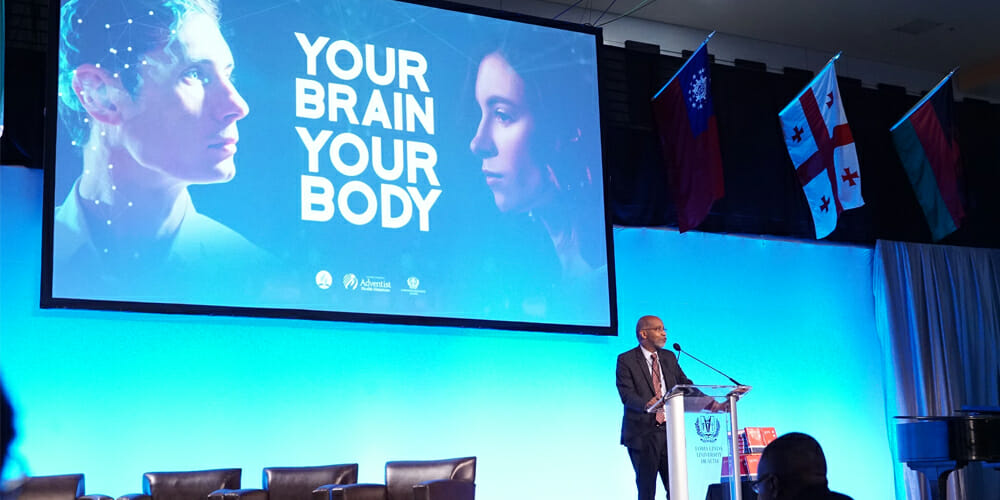Conference on Global Health and Lifestyle kicks off with practical insights and revelations.

The 3rd Conference on Global Health and Lifestyle at Loma Linda, California, United States, kicked off on July 9, 2019 with minimum formalities and got right down to business.
The five-day event, which has gathered more than 800 Seventh-day Adventist church leaders, health practitioners, and healthy-living advocates from 90 countries, made the most of sharing practical insights and useful tips for healthy living.
“We are fearfully and wonderfully made,” said Adventist Health Ministries director Peter Landless in his opening remarks. It is a fact, he emphasized, that frames prospective discussions and exchanges during the conference.
Following Landless’ lead, plenary presentations during the day went on to share how even in the face of growing public health concerns, small changes can go a long way to helping people fend off disease and enjoy a better life.
Free Medicine Against Cognitive Decline
“Exercise influences the proliferation of new neurons and increases the production of molecules secreted from neurons that are involved in learning and memory,” said Harvard professor and researcher David Williams in the opening plenary. Williams, who was recently elected to the National Academy of Sciences, shared straightforward, research-based tips that can not only improve personal health but also increase a local church’s footprint in its community.
In the first part of his presentation, Williams discussed the growing challenge posed by Alzheimer’s disease, which reveals “the biggest increase ever for any disease over a decade.”
“Data shows a 71 percent increase in deaths due to Alzheimer’s from 2000 to 2013,” Williams said. “And Alzheimer’s rose from 25th to 12th most burdensome disease, and from 32nd to 9th for years of life lost.”
Even though modern medicine tends to resort to pharmacological support as a major treatment option, Williams said that exercise and diet can help to fend off cognitive decline and improve a person’s overall state once the disease starts progressing.
“Exercise is an understudied treatment option for Mild Cognitive Impairment (MCI),” Williams said. It is something of utmost importance to reverse this trend, he said, since more than half of adults with MCI will progress to Alzheimer’s within five years.
But exercise can help to improve a person’s cognitive functions because it increases blood flow and seems to prevent hippocampal atrophy, which is essential for episodic memory, he said.
A Historical Position
This position is based on the latest scientific research, but it is nothing new for Seventh-day Adventists, Williams noted. He quoted Adventist Church cofounder Ellen G. White, who wrote more than a century ago, “A walk, even in winter, would be more beneficial to the health than all the medicine the doctors may prescribe” (Counsels on Health, p. 52).
Now science is confirming that assertion, Williams said, as recent research has shown that exercise is linked to improved attention and processing speed, executive function, and memory. The most exciting finding about it? “The duration and the intensity of the exercise did not matter for benefits to occur,” Williams reported. “Any exercise we engage in can help improve our cognitive functions.”
The same applies to the impact of diet, Williams said, as research has confirmed time after time that a Mediterranean diet (one that favors green leafy vegetables, nuts, berries, and whole grains while discouraging red meats, cheese, pastries, and fried foods) leads to improvements in cognitive function.
“Studies have shown that following this diet predicted a substantially slower decline in overall cognitive function,” Wiliams reported, quoting a 2015 study. “The rate of decline was equivalent to the person being seven and a half years younger in age.”
The Most Physically Fit People on Earth
Given the amount of scientific evidence and the church’s historical positions, “Seventh-day Adventists should be the most physically fit people on earth,” Williams asserted. He went on to give some simple tips local churches can engage in to promote health and reach out to the community.
“By encouraging, supporting, and facilitating dog walking, for instance, churches can promote increased physical activity,” he said. Williams also mentioned mall walking programs for seniors and a greater emphasis on instilling positive emotions in other people.
“Research has shown persons who scored high on purpose in life indicators were 2.4 times more likely to remain free of Alzheimer’s than a person with a low score,” he shared. “And higher purpose in life reduced the negative effects of Alzheimer’s’ pathological changes.”
It is something that presents outstanding opportunities for ministry, Williams said, as optimism and gratitude have also proved to be highly beneficial for health.
“It’s all about glorifying God in the common things of life, just like Jesus did,” he said.
The Church Potluck Effect
But there’s a caveat, Williams said. It is what he called the Church Potluck Effect.
“Research has shown that people who attend and eat at church regularly tend to be more obese than those who don’t,” Williams shared.
How, then, to fight against this trend?
It requires, among other things, that we make exercise a priority, Williams said. He again quoted White, who in Testimonies for the Church wrote, “Go out and exercise every day, even though some things indoors have to be neglected” (vol. 2, p. 531).
It is the safest bet to fend off disease and enjoy a fruitful life, he said.
Adventist Review will provide continuing coverage of the 3rd Conference on Global Health and Lifestyle.









